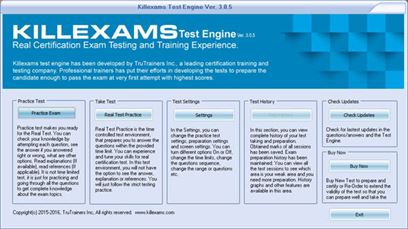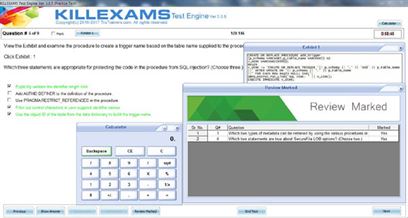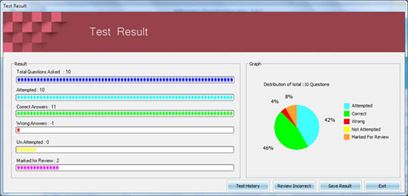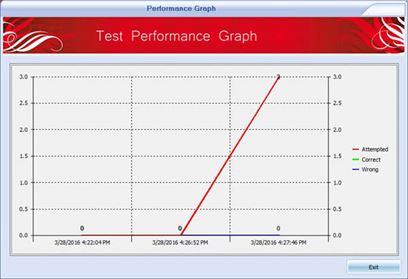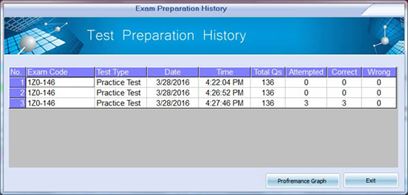Genesys Cloud Certified Professional - Contact Center Administration Exam Braindumps
Killexams.com GCP-GC-ADM Exam Braindumps contain complete question pool, updated in July 2024 including VCE exam simulator that will help you get high marks in the exam. All these GCP-GC-ADM exam questions are verified by killexams certified professionals and backed by 100% money back guarantee.
Containing Latest 2024 Updated Genesys Cloud Certified Professional - Contact Center Administration Syllabus Questions
GCP-GC-ADM test Dumps of real Questions
Practice Tests with real GCP-GC-ADM test Questions - Updated on Daily Basis
100% Pass Guarantee

GCP-GC-ADM test questions : Download 100% Free GCP-GC-ADM test Dumps
Exam Number : GCP-GC-ADM
Exam Name : Genesys Cloud Certified Professional - Contact Center Administration
Vendor Name : Genesys
Update : Click Here to Check Latest Update
Question Bank : Check Questions
Newly up-date content associated with GCP-GC-ADM examination with cost-free cheat sheet obtain
Our staff members now have legitimate and Approved Genesys Cloud Certified Professional - Contact Center Administration PDF Braindumps. killexams.com provides majority of kinds and the majority associated with recent GCP-GC-ADM Exam dumps which almost include all test topics. With all the particular database in our GCP-GC-ADM Practice Questions, there will be no need in order to chance your chance on studying research ebooks and undoubtedly need to lose thru 10-20 hrs to ace our personal GCP-GC-ADM PDF Braindumps and solutions.
Driving Genesys Cloud Certified Professional - Contact Center Administration quiz is considerably more easier should you have crystal clear aspects of GCP-GC-ADM syllabus and also go through the 2022 updated query bank. Examining and doing real issues is considerably more better intended for quick good results. You have to understand more about difficult issues asked inside real GCP-GC-ADM exam. Due to, you have to check out killexams.com and down load Free GCP-GC-ADM Real test Questions examination questions and also read. If you think that you can hold on tight those GCP-GC-ADM questions, you could register to help obtain Latest Questions of GCP-GC-ADM Exam Cram. That will be a suitable toward excellent progress. Find VCE quiz simulator inside your PCs or even smartphones. Go through and remember GCP-GC-ADM boot camp and consider practice examination as much as possible along with VCE quiz simulator. If you feel that you will have memorized the questions in the Genesys Cloud Certified Professional - Contact Center Administration questions traditional bank, go to examination center and also enroll intended for real examination.
Features of Killexams GCP-GC-ADM Exam Cram
-> Instant GCP-GC-ADM Latest Questions down load Access
-> Thorough GCP-GC-ADM Issues and Solutions
-> 98% Achievement Rate involving GCP-GC-ADM Quiz
-> Guaranteed real GCP-GC-ADM quiz questions
-> GCP-GC-ADM Questions Kept up to date on Typical basis.
-> Logical and 2022 Updated GCP-GC-ADM test Blues
-> 100% Lightweight GCP-GC-ADM Quiz Files
-> Complete featured GCP-GC-ADM VCE Quiz Simulator
-> Zero Limit in GCP-GC-ADM Quiz obtain Accessibility
-> Great Vouchers
-> 100% Guaranteed obtain Consideration
-> 100% Privacy Ensured
-> 100 % Success Warranty
-> 100% Free of charge boot camp structure Questions
-> Zero Hidden Charge
-> No Regular monthly Charges
-> Zero Automatic Consideration Renewal
-> GCP-GC-ADM test Upgrade Intimation by means of Email
-> Free of charge Technical Support
Discount Discount on Complete GCP-GC-ADM Real test Questions Latest Questions;
WC2020: 60 per cent Flat Price cut on each quiz
PROF17: 10% Further Price cut on Worth Greater than $69
DEAL17: 15% Further Price cut on Worth Greater than 99 dollars

GCP-GC-ADM test Format | GCP-GC-ADM Course Contents | GCP-GC-ADM Course Outline | GCP-GC-ADM test Syllabus | GCP-GC-ADM test Objectives
Exam Specification: GCP-GC-ADM Genesys Cloud Certified Professional - Contact Center Administration
Exam Name: GCP-GC-ADM Genesys Cloud Certified Professional - Contact Center Administration
Exam Code: GCP-GC-ADM
Exam Duration: 90 minutes
Passing Score: Not specified
Exam Format: Multiple-choice questions
Course Outline:
1. Introduction to Genesys Cloud Contact Center
- Overview of Genesys Cloud platform
- Key features and components of Genesys Cloud contact center
- Understanding contact center administration roles and responsibilities
2. Contact Center Configuration and Setup
- Setting up and configuring Genesys Cloud contact center
- Managing organizations, divisions, and users
- Configuring roles and permissions
3. Contact Routing and Queuing
- Configuring routing strategies and rules
- Defining queues and skills
- Configuring routing policies and priority
4. IVR and Call Flows
- Designing and configuring IVR (Interactive Voice Response) systems
- Creating and managing call flows
- Implementing self-service options and voice prompts
5. Agent Management and Performance
- Managing agent profiles and permissions
- Monitoring agent performance and productivity
- Configuring agent groups and teams
6. Reporting and Analytics
- Generating and interpreting contact center reports
- Analyzing contact center metrics and KPIs
- Using analytics tools for performance optimization
Exam Objectives:
1. Understand the features and components of Genesys Cloud contact center.
2. Configure and set up the contact center environment.
3. Manage organizations, divisions, users, roles, and permissions.
4. Configure contact routing strategies, queues, and skills.
5. Design and configure IVR systems and call flows.
6. Manage agent profiles, permissions, and teams.
7. Monitor agent performance and productivity.
8. Generate and analyze contact center reports and analytics.
Exam Syllabus:
Section 1: Introduction to Genesys Cloud Contact Center (10%)
- Overview of Genesys Cloud platform
- Contact center administration roles and responsibilities
Section 2: Contact Center Configuration and Setup (20%)
- Setting up and configuring Genesys Cloud contact center
- Managing organizations, divisions, and users
- Configuring roles and permissions
Section 3: Contact Routing and Queuing (20%)
- Routing strategies and rules
- Queues and skills configuration
- Routing policies and priority
Section 4: IVR and Call Flows (20%)
- IVR design and configuration
- Call flow creation and management
- Self-service options and voice prompts
Section 5: Agent Management and Performance (15%)
- Agent profiles and permissions
- Agent performance monitoring
- Agent groups and teams configuration
Section 6: Reporting and Analytics (15%)
- Contact center reports generation and interpretation
- Contact center metrics and KPI analysis
- Analytics tools for performance optimization
Killexams Review | Reputation | Testimonials | Feedback
Download and Try out these real GCP-GC-ADM question .
I passed the GCP-GC-ADM test way to this package. The questions are correct, and so are the subjects and observe courses. The layout will be very convenient and allows you to the test in distinct codecs - practicing at the test simulator, studying PDFs and printouts, so that you can exercise session the fashion and balance that is right for you. I individually loved working towards the test simulator. It fully simulates the exam, which is in particular vital for GCP-GC-ADM exam, with all their precise question types. So, It is a bendy yet dependable way to achieve your GCP-GC-ADM certification. I'll be the use of killexams.com for my subsequent stage certification exams, too.
Weekend study is enough to pass GCP-GC-ADM test with Questions Answers I were given.
To get prepared for GCP-GC-ADM practice test calls for lots of tough work and time. Time control is this type of complex problem, that can be rarely resolved. However, killexams.com certification has in reality resolved this trouble from its root stage, through presenting a range of time schedules, in order which you in all likelihood can without problems whole his syllabus for GCP-GC-ADM practice exam. killexams.com certification offers all of the educational courses that are essential for the GCP-GC-ADM practice exam. So I need to mention without dropping a while, begin your instruction beneath killexams.com certifications to get an excessive score in GCP-GC-ADM practice test and make yourself sense on the top of this worldwide know-how.
Just use these real dumps collection and success is yours.
Your questions square degree appallingly similar to real ones. passed the GCP-GC-ADM test the other day. I would have no longer executed it at the same time as not your test homework material. various months agene I fizzling that test the essential time I took it. killexams.com Questions Answers and test Simulator are a Great thing for me. I completed the test frightfully this factor.
Surprised to see GCP-GC-ADM real test questions!
I can recommend you to return right here to remove all fears associated with GCP-GC-ADM certification because that is an incredible platform to offer you confident test dumps in your preparations. I was concerned for GCP-GC-ADM test however all way to killexams.com who provided me with the exquisite product for my preparation. I was truly concerned about my achievement but it become the best GCP-GC-ADM test engine that expanded my fulfillment confidence and now I am feeling pride in this unconditional assistance. Hats off to you and your unbelievable services for all students and specialists!
Do you want real test questions latest GCP-GC-ADM test to read?
Attempting a few braindumps, I at remaining halted at Dumps and it contained precise answers added in a simple manner that turned into precisely what I required. I was scuffling with subjects when my test GCP-GC-ADM turned into the simplest 10 days away. I was scared that I will now not have the ability to attain passing score the bottom pass scores. I at remaining passed with 78% marks without an awful lot of inconvenience.
Genesys braindumps
Unquestionably it is hard assignment to pick dependable certification questions/answers assets regarding review, reputation and validity since individuals get sham because of picking incorrectly benefit. Killexams.com ensure to serve its customers best to its assets concerning test dumps update and validity. The vast majority of other's sham report dissension customers come to us for the brain dumps and pass their exams joyfully and effortlessly. We never trade off on our review, reputation and quality on the grounds that killexams review, killexams reputation and killexams customer certainty is imperative to us. Uniquely we deal with killexams.com review, killexams.com reputation, killexams.com sham report objection, killexams.com trust, killexams.com validity, killexams.com report and killexams.com scam. On the off chance that you see any false report posted by our rivals with the name killexams sham report grievance web, killexams.com sham report, killexams.com scam, killexams.com protest or something like this, simply remember there are constantly awful individuals harming reputation of good administrations because of their advantages. There are a huge number of fulfilled clients that pass their exams utilizing killexams.com brain dumps, killexams PDF questions, killexams hone questions, killexams test simulator. Visit Killexams.com, our specimen questions and test brain dumps, our test simulator and you will realize that killexams.com is the best brain dumps site.
Is Killexams.com Legit?
Yes, Killexams is practically legit and even fully efficient. There are several characteristics that makes killexams.com legitimate and authentic. It provides up to par and practically valid test dumps that contains real exams questions and answers. Price is very low as compared to many of the services on internet. The Questions Answers are modified on frequent basis through most recent brain dumps. Killexams account setup and device delivery is extremely fast. Data downloading is usually unlimited and very fast. Service is avaiable via Livechat and Netmail. These are the characteristics that makes killexams.com a sturdy website which provide test dumps with real exams questions.
Is killexams dumps dependable?
Simple answer is YES. There are several Questions Answers provider in the market claiming that they provide real test Questions, Braindumps, Practice Tests, Study Guides, cheat sheet and many other names, but most of them are re-sellers that do not update their contents frequently. Killexams.com is best website of Year 2024 that understands the issue candidates face when they spend their time studying obsolete contents taken from free pdf obtain sites or reseller sites. Thats why killexams.com update test Questions Answers with the same frequency as they are updated in Real Test. test dumps provided by killexams.com are Reliable, Up-to-date and validated by Certified Professionals. They maintain dumps collection of valid Questions that is kept up-to-date by checking update on daily basis.
If you want to Pass your test Fast with improvement in your knowledge about latest course contents and syllabus of new syllabus, We recommend to obtain PDF test Questions from killexams.com and get ready for real exam. When you feel that you should register for Premium Version, Just choose visit killexams.com and register, you will receive your Username/Password in your Email within 5 to 10 minutes. All the future updates and changes in Questions Answers will be provided in your obtain Account. You can obtain Premium test Dumps files as many times as you want, There is no limit.
Killexams.com has provided VCE practice questions Software to Practice your test by Taking Test Frequently. It asks the Real test Questions and Marks Your Progress. You can take test as many times as you want. There is no limit. It will make your test prep very fast and effective. When you start getting 100% Marks with complete Pool of Questions, you will be ready to take real Test. Go register for Test in Test Center and Enjoy your Success.
Other Genesys test dumps
GCX-ARC practice exam | PC-CIC-Core test questions | GCP-GC-ADM practice test | GE0-803 cbt | GE0-807 test questions | GE0-806 training material |
GCP-GC-ADM - Genesys Cloud Certified Professional - Contact Center Administration test dumps
GCP-GC-ADM - Genesys Cloud Certified Professional - Contact Center Administration education
GCP-GC-ADM - Genesys Cloud Certified Professional - Contact Center Administration PDF Questions
GCP-GC-ADM - Genesys Cloud Certified Professional - Contact Center Administration certification
GCP-GC-ADM - Genesys Cloud Certified Professional - Contact Center Administration braindumps
GCP-GC-ADM - Genesys Cloud Certified Professional - Contact Center Administration braindumps
GCP-GC-ADM - Genesys Cloud Certified Professional - Contact Center Administration braindumps
GCP-GC-ADM - Genesys Cloud Certified Professional - Contact Center Administration real questions
GCP-GC-ADM - Genesys Cloud Certified Professional - Contact Center Administration test prep
GCP-GC-ADM - Genesys Cloud Certified Professional - Contact Center Administration tricks
GCP-GC-ADM - Genesys Cloud Certified Professional - Contact Center Administration information source
GCP-GC-ADM - Genesys Cloud Certified Professional - Contact Center Administration learning
GCP-GC-ADM - Genesys Cloud Certified Professional - Contact Center Administration education
GCP-GC-ADM - Genesys Cloud Certified Professional - Contact Center Administration PDF Braindumps
GCP-GC-ADM - Genesys Cloud Certified Professional - Contact Center Administration test
GCP-GC-ADM - Genesys Cloud Certified Professional - Contact Center Administration techniques
GCP-GC-ADM - Genesys Cloud Certified Professional - Contact Center Administration information search
GCP-GC-ADM - Genesys Cloud Certified Professional - Contact Center Administration PDF Download
GCP-GC-ADM - Genesys Cloud Certified Professional - Contact Center Administration test Questions
GCP-GC-ADM - Genesys Cloud Certified Professional - Contact Center Administration Dumps
GCP-GC-ADM - Genesys Cloud Certified Professional - Contact Center Administration tricks
GCP-GC-ADM - Genesys Cloud Certified Professional - Contact Center Administration Free test PDF
GCP-GC-ADM - Genesys Cloud Certified Professional - Contact Center Administration Practice Questions
GCP-GC-ADM - Genesys Cloud Certified Professional - Contact Center Administration test dumps
GCP-GC-ADM - Genesys Cloud Certified Professional - Contact Center Administration real questions
GCP-GC-ADM - Genesys Cloud Certified Professional - Contact Center Administration questions
GCP-GC-ADM - Genesys Cloud Certified Professional - Contact Center Administration test contents
GCP-GC-ADM - Genesys Cloud Certified Professional - Contact Center Administration test Questions
GCP-GC-ADM - Genesys Cloud Certified Professional - Contact Center Administration real questions
GCP-GC-ADM - Genesys Cloud Certified Professional - Contact Center Administration outline
GCP-GC-ADM - Genesys Cloud Certified Professional - Contact Center Administration test Questions
GCP-GC-ADM - Genesys Cloud Certified Professional - Contact Center Administration Practice Questions
GCP-GC-ADM - Genesys Cloud Certified Professional - Contact Center Administration answers
GCP-GC-ADM - Genesys Cloud Certified Professional - Contact Center Administration test
GCP-GC-ADM - Genesys Cloud Certified Professional - Contact Center Administration Dumps
GCP-GC-ADM - Genesys Cloud Certified Professional - Contact Center Administration course outline
GCP-GC-ADM - Genesys Cloud Certified Professional - Contact Center Administration test
GCP-GC-ADM - Genesys Cloud Certified Professional - Contact Center Administration Practice Questions
GCP-GC-ADM - Genesys Cloud Certified Professional - Contact Center Administration learning
GCP-GC-ADM - Genesys Cloud Certified Professional - Contact Center Administration syllabus
GCP-GC-ADM - Genesys Cloud Certified Professional - Contact Center Administration Question Bank
GCP-GC-ADM - Genesys Cloud Certified Professional - Contact Center Administration Dumps
GCP-GC-ADM - Genesys Cloud Certified Professional - Contact Center Administration questions
GCP-GC-ADM - Genesys Cloud Certified Professional - Contact Center Administration information source
Best Certification test Dumps You Ever Experienced
Google-PCA test example | ASSET cheat sheet | LEED-GA study guide | MS-101 examcollection | SPLK-3003 questions download | FAR test answers | NREMT-PTE test exam | 5V0-35.21 test preparation | CPAT VCE | 8008 real questions | 4A0-115 test prep | AHN-BC study guide | CFP Practice Questions | 4A0-114 real questions | 4A0-116 question test | TM1-101 study questions | TA12 braindumps | CCJE prep questions | CTIL-001 free online test | 1V0-31.21 test prep |
Latest Updated Exams
ACA-CCN Free PDF | ACNPC-AG assessment test sample | ACHPN study material | ACCNS-AG free pdf download | ABWM-CWS practice exam | ABNN-SCRN brain dumps | AANP-AGNP braindumps | AACN-CSC brain dumps | CNRN Practice Test | AACN-CCRN-K study guide | NAB-NHA past bar exams | ACNP-BC test Questions | ACCNS-P certification sample | ACRP-CCRC training material | AACN-CNL PDF Dumps | ACLPN real questions | HANCB-ACRN test questions | ACCNS-N boot camp | ACNS-BC free pdf | ABWM-CWCA pdf download |
References :
Similar Websites :
iKillexams Certification test dumps
Pass4Sure test Questions and Dumps
Killexams.com GCP-GC-ADM Exam Simulator Screens
Exam Simulator 3.0.9 uses the actual Genesys GCP-GC-ADM questions and answers that make up Exam Braindumps. GCP-GC-ADM Exam Simulator is full screen windows application that provide you the experience of same test environment as you experience in test center.
About Us
We are a group of Certified Professionals, working hard to provide up to date and 100% valid test questions and answers.

Who We Are
We help people to pass their complicated and difficult Genesys GCP-GC-ADM exams with short cut Genesys GCP-GC-ADM Exam Braindumps that we collect from professional team of Killexams.com
What We Do
We provide actual Genesys GCP-GC-ADM questions and answers in Exam Braindumps that we obtain from killexams.com. These Exam Braindumps contains up to date Genesys GCP-GC-ADM questions and answers that help to pass exam at first attempt. Killexams.com develop Exam Simulator for realistic exam experience. Exam simulator helps to memorize and practice questions and answers. We take premium exams from Killexams.com
Why Choose Us
Exam Braindumps that we provide is updated on regular basis. All the Questions and Answers are verified and corrected by certified professionals. Online test help is provided 24x7 by our certified professionals. Our source of exam questions is killexams.com which is best certification exam Braindumps provider in the market.
Happy clients
Vendors
Exams Provided
Testimonials
Contact Us
We provide Live Chat and Email Support 24x7. Our certification team is available only on email. Order and Troubleshooting support is available 24x7.
4127 California St,
San Francisco, CA 22401

+1 218 180 22490
